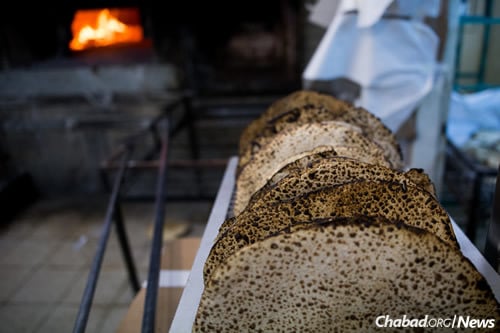On the outside, the C. family appears unremarkable. Both parents leave their modest townhouse to go to work every morning, while their four children head off to the local Jewish day school.
Yet behind closed doors, a very different story unfolds. The peeling paint and bare pantry tell of poverty that’s been slowly creeping up on the family of six. “I’ve always been a hard worker,” attests Mr. C., “but I took heavy losses on the market, and have been struggling to cover our debts while keeping our children in school and our family in our house.”
Understandably, Jewish holidays have become particularly challenging for the couple. “We always try to get something ‘new’ for the kids to wear from the local gemach,” an organization that gives gently-used clothing a second life, says Mrs. C., “but the real challenge is how to manage the food bills. Matzah, wine, meat, poultry—it’s just an expensive time, however you look at it.”
And each year for six years, they have received a check in their mailbox in the days before Passover, with a simple card wishing them a “Kosher and Happy Passover.”
In Jewish communities all over the world, special monies are raised for the express purpose of helping impoverished families with Passover expenses.
In ancient times, these funds would help families procure flour with which to bake their own matzah. That’s why they are generally known by the two Aramaic names of Maot Chitim (“wheat money”) or Kimcha DePischa (“Passover flour”).

An Ancient Charitable Custom
While the origins of this tradition are shrouded in the veil of time, Rabbi Yossi bar Avun, who flourished in the Land of Israel in the fourth century, mentions this custom as a matter of fact in a statement recorded in the Jerusalem Talmud.
It is further strengthened and codified in the writings of the Ashkenazi halachists of the Middle Ages.
By the 18th century, the practice remained common. Thus, Rabbi Schneur Zalman of Liadi writes: “It is a widespread custom amongst all of Israel that every single community places a tax upon its citizens for the purpose of [procuring] wheat for Passover to distribute to the members of their community.”
Even though the highly organized communal structure that governed Eastern European life has largely disappeared—and taxes are no longer levied—Jewish communities still raise millions of dollars every year for Passover essentials for those in the community struggling to acquire them.
“We make sure to give each person according to his needs,” says Rabbi Kushi Schusterman, executive director of Harford Chabad in suburban Bel Air, which lies northeast of Baltimore. “For some people, it’s a simple cash gift. Other times, it’s going the extra mile to make sure that people get invited to meals since they would be hurt to think of themselves as charity recipients.”
While he concedes that most people in his community are not in danger of starvation, Schusterman attests that people live month-to-month in every community, and that “there are people who need to make the difficult choice between a box of matzah and a pair of shoes.”
Like many other Chabad rabbis, Schusterman says his inspiration to raise and distribute these funds comes from the Rebbe—Rabbi Menachem M. Schneerson, of righteous memory—who would make it a point to encourage people to participate in the yearly collections.
In fact, merely weeks after he formally accepted the mantle of leadership of the Chabad-Lubavitch movement in the winter of 1951, the Rebbe actively solicited “wheat money.”
Longstanding efforts like those at Colel Chabad and Chabad-Lubavitch World Headquarters raise and distribute significant sums to the needy around the world prior to Passover.
In a letter to Chicago businessman Shlomo Palmer, the Rebbe asks him to continue the noble practice of collecting money, which the Rebbe would then disburse in response to the “many requests for help [that] are reaching me from the needy here, the needy in our Holy Land and in Europe.”

Acknowledging the money sent by congregants of the Nusach Ari synagogue in Chicago, then led by Rabbi Solomon S. Hecht, the Rebbe wrote that “the beginning of the celebration of Pesach starts with the announcement: ‘Let all who are hungry come and eat; let all who are needy, come and celebrate Pesach.’ In other words, even before we begin our own seder, we tell all those who are needy that we will give them everything they need. Afterwards, we proceed to the seder.”
‘Educate the Children’
The Rebbe’s correspondence—with letters to children in the Chabad-run Achei Tmimin schools in Boston and Pittsburgh—reveals that his campaign also included day-school students.
“It’s the way we educate the children,” says Esther Ciment, who has led the school in Boston since 1952 with her husband, Rabbi Chaim Ciment. “Before you can celebrate your own Pesach, you need to make sure that others have been looked after as well.”
In many schools, children use creative means to raise funds. Just north of Chicago, each of the eight grades at the Cheder Lubavitch Hebrew Day School runs its own campaign. The third and fourth grades hold raffles; seventh-graders sell candle, spoon and feather sets to be used during the pre-Passover search for chametz;and the kids in second grade hold a “Tehillimathon,” whereby family and friends sponsor their recitation of Psalms on a Shabbat morning prior to Passover.
Rabbi Meir S. Moscowitz, regional director of Lubavitch Chabad of Illinois, says he has a number of community members who work closely with him, discreetly passing on information concerning families who couldn’t make ends meet.
“I grew up seeing my father sitting at the dining-room table quietly scheming about how to get money to people in an honorable manner,” he says about his Rabbi Daniel Moscowitz, who led Lubavitch Chabad until his sudden passing in 2014. “Until today, all the money is raised and distributed locally. This is really an example of one community doing what it can to help our extended family—our Jewish brothers and sisters in need.”









Start a Discussion